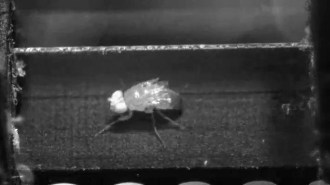Uncategorized
-
 Neuroscience
NeuroscienceTiny treadmills show how fruit flies walk
A method to force fruit flies to move shows the insects’ stepping behavior and holds clues to other animals’ brains and movement.
-
 Animals
AnimalsHibernating bumblebee queens have a superpower: Surviving for days underwater
After some bumblebee queens were accidentally submerged in water and survived, researchers found them to be surprisingly tolerant of flooding.
-
 Health & Medicine
Health & MedicineWhat can period blood reveal about a person’s health?
The FDA recently approved a menstrual blood test for diabetes, the first diagnostic of any kind based on period blood. It may be just the beginning.
By Payal Dhar -
 Science & Society
Science & SocietyIn ‘Get the Picture,’ science helps explore the meaning of art
Journalist Bianca Bosker infiltrates the secretive art world to understand the science and psychology of why art matters to the human experience.
By Shi En Kim -
 Artificial Intelligence
Artificial IntelligenceThis robot can tell when you’re about to smile — and smile back
Using machine learning, researchers trained Emo to make facial expressions in sync with humans.
-
 Animals
AnimalsThis newfound longhorn beetle species is unusually fluffy
Discovered in Australia, the beetle is covered in whitish hairs and has distinctive eye lobes, antennae and leg shapes.
-
 Animals
Animals50 years ago, scientists wondered how birds find their way home
In the 1970s, lab tests hinted that birds can navigate using magnetic fields. New studies suggest that beak and eye proteins are behind the ability.
-

-

Rethinking how we live with wildfires
Editor in chief Nancy Shute discusses a new approach for managing wildfires that includes collaboration with local and Indigenous communities.
By Nancy Shute -
 Math
MathScientists find a naturally occurring molecule that forms a fractal
The protein assembles itself into a repeating triangle pattern. The fractal seems to be an accident of evolution, scientists say.
-
 Animals
AnimalsIn a first, these crab spiders appear to collaborate, creating camouflage
Scientists found a pair of mating crab spiders blending in with a flower. The report may be the first known case of cooperative camouflage in spiders.
-
 Life
LifeThis marine alga is the first known eukaryote to pull nitrogen from air
An alga’s bacterial symbiote has evolved into an organelle that turns atmospheric nitrogen into ammonia, making the alga unique among eukaryotes.
By Jake Buehler